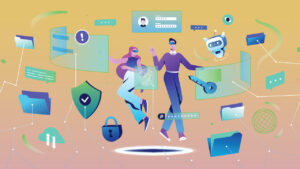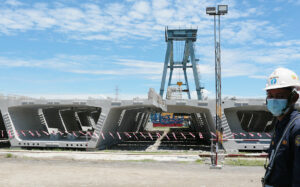Embracing the next digital revolution: Why AI, blockchain and cybersecurity are essential for Philippine organizations

In today’s fast-paced digital era, the landscape of business is transforming at an unprecedented rate. Global advancements in technology are not only reshaping industries in developed economies but are also redefining how organizations operate here in the Philippines. For business leaders and executives, understanding and leveraging emerging technologies is no longer optional — it is an imperative.
Among the technologies making significant strides are Artificial Intelligence (AI), blockchain, and cybersecurity, what I call the “ABC” of the new digital age. These three pillars are rapidly becoming the foundation upon which competitive, resilient, and forward-thinking organizations are built.
AI, with its capability to analyze vast amounts of data, is transforming traditional decision-making processes. In Philippine boardrooms, leaders are increasingly turning to AI-driven tools to derive actionable insights from data, optimize operations, and enhance customer experiences. For instance, AI-powered analytics can help companies predict market trends, streamline supply chains, and even personalize marketing strategies to meet the unique needs of Filipino consumers. Small- and medium-enterprises (SMEs) that once struggled to compete with their larger counterparts are now finding that AI offers a cost-effective way to level the playing field. By automating routine tasks and providing data-driven insights, AI not only boosts efficiency but also frees up executives to focus on strategic innovation. As local businesses continue to digitize, the adoption of AI is becoming a strategic priority for those aiming to remain agile and competitive in a rapidly evolving market.
Meanwhile, blockchain technology, often associated with cryptocurrencies, has far-reaching implications beyond digital finance. In the Philippines, where trust and transparency in transactions are highly valued, blockchain presents a robust solution to age-old challenges. With its decentralized and immutable ledger, blockchain can enhance transparency across various sectors — from supply chain management to real estate transactions. Imagine a scenario where every transaction, shipment, or property deal is recorded securely and transparently on a blockchain, thereby reducing fraud and enhancing trust among stakeholders. This technology is particularly valuable in an environment where regulatory compliance and data integrity are paramount. For industries such as remittances, logistics, and even government services, blockchain can streamline operations, reduce corruption risks, and ultimately contribute to a more secure and efficient business ecosystem.
As organizations become increasingly digital, the need to protect sensitive information and critical infrastructure has never been more pronounced. Cybersecurity is at the forefront of this challenge, safeguarding both data and reputation. The Philippines, with its growing digital economy, is no stranger to cyber threats. From ransomware attacks to phishing scams, businesses are facing an array of risks that can jeopardize operations and erode consumer trust. In this context, robust cybersecurity measures are essential not only to defend against external attacks but also to secure the digital transformation journey. Companies that invest in comprehensive cybersecurity strategies are better positioned to protect customer data, maintain regulatory compliance, and ensure business continuity. For CEOs and executives, understanding the interconnected nature of technology and security is crucial; without strong cybersecurity, the benefits of AI and blockchain can be severely undermined by vulnerabilities.
What is particularly exciting is how these three technologies — AI, blockchain, and cybersecurity — can complement each other to create a resilient digital framework. AI’s capabilities in predictive analytics and automation enhance operational efficiency, but they also open new avenues for cyberattacks if not adequately protected. Blockchain can provide the tamper-proof security layer needed to protect data integrity, while cybersecurity protocols ensure that the entire digital ecosystem remains secure from evolving threats. This integration is not merely about adding layers of technology; it’s about creating a holistic, secure, and efficient environment where innovation can flourish. In the Philippines, where the pace of digital adoption is accelerating, integrating these technologies can lead to transformative changes in how businesses operate and compete on both local and international stages.
The benefits of embracing this digital trinity are manifold for Philippine organizations. For one, enhanced efficiency through AI-driven automation can lead to significant cost savings and improved productivity — a critical advantage in a competitive market. Blockchain’s role in increasing transparency can boost consumer confidence and attract investment, especially in sectors where trust is a key factor. Meanwhile, a strong cybersecurity framework not only protects assets but also helps companies avoid the substantial financial and reputational damage associated with data breaches. As businesses of all sizes — from startups to established conglomerates — navigate the complexities of the digital era, recognizing and adopting these technologies will be crucial for sustained growth and competitiveness.
However, the road to digital transformation is not without its challenges. Many Philippine organizations face hurdles such as a shortage of skilled talent, resistance to change, and infrastructural limitations. Moreover, regulatory frameworks are still evolving to keep pace with technological advancements, which can create uncertainties for businesses looking to invest heavily in digital solutions. Despite these challenges, there is a growing momentum among both the private and public sectors to foster innovation and digital literacy. Government initiatives aimed at enhancing digital infrastructure and investing in technology education are beginning to bridge the gap, paving the way for a more robust digital economy.
For business leaders in the Philippines, the message is clear: the future is digital, and the time to act is now. Investing in AI, blockchain, and cybersecurity is not just about staying ahead of the curve — it is about securing a competitive edge in an increasingly interconnected and dynamic market. By adopting these technologies, organizations can unlock new opportunities, streamline operations, and build a more resilient and trustworthy business model. As we witness a global shift towards digitalization, it is imperative that Philippine companies not only keep pace with international trends but also tailor these innovations to address local challenges and opportunities.
The future is now. The integration of AI, blockchain, and cybersecurity is set to redefine the business landscape in the Philippines. These technologies offer transformative benefits that extend far beyond operational efficiency, impacting everything from strategic decision-making to customer trust. As executives and leaders chart the course for the future, embracing this digital revolution will be key to not only surviving but thriving in a rapidly changing world. The call to action is clear: adopt, adapt, and innovate, ensuring that Philippine organizations remain at the forefront of the global digital revolution.
Dr. Donald Lim is the founding president of the Global AI Council Philippines and the Blockchain Council of the Philippines, and the founding chair of the Cybersecurity Council, whose mission is to advocate the right use of emerging technologies to propel business organizations forward. He is currently the president and COO of DITO CME Holdings Corp.




